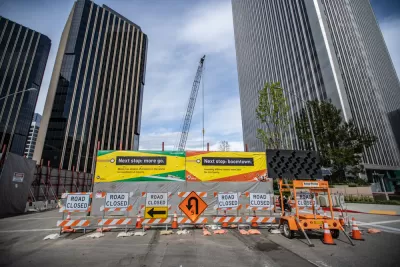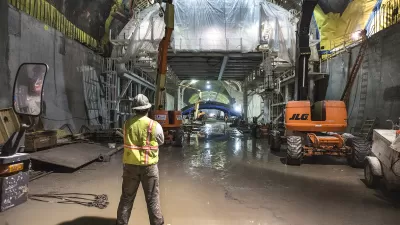Researchers are cataloging the costs of transit projects around the world in an attempt to identify ways to bring costs down and spend transit funding more efficiently.

In an article for Governing, Jared Brey describes the Transit Costs Project, which compares the costs of transit projects around the world to help identify and understand cost variations and how projects can become more cost-effective.
According to the project’s early findings, “The United States is the sixth most expensive country in the world when it comes to building rapid rail projects,” with reasons ranging “from the politicization of project management to the expanding role of consultants, the costs of labor, and efforts to limit disruption to normal traffic flow during construction.”
Governing spoke with project leader Eric Goldwyn, who said, “In the countries that are more expensive than the U.S., they’re building 65 percent or more of their projects underground, and in the U.S., we’re only building like 37 percent of our projects underground. So we’re choosing a less expensive method and we’re still very close to being the most expensive in the world.”
Goldwyn explains that long public review processes drive up costs simply due to inflation, while elaborate station plans also add to costs and reduce the number of stations that can be built under budget. High construction costs matter because they lead to drastically diminished transportation systems and fuel opposition to transit projects.
On what cities are doing right, Goldwyn says “The one thing we see is a heavy emphasis on standardization of design and really trying to economize as much as possible.” When it comes to labor costs, even cities with high worker pay rates can achieve low project costs through labor-saving technologies and other innovations. “It’s not about paying people less. It’s about, don’t spend as many hours doing something, and don’t use as many people to do that thing.”
FULL STORY: Why Are U.S. Transit Projects So Costly? This Group Is on the Case.

Planetizen Federal Action Tracker
A weekly monitor of how Trump’s orders and actions are impacting planners and planning in America.

Maui's Vacation Rental Debate Turns Ugly
Verbal attacks, misinformation campaigns and fistfights plague a high-stakes debate to convert thousands of vacation rentals into long-term housing.

San Francisco Suspends Traffic Calming Amidst Record Deaths
Citing “a challenging fiscal landscape,” the city will cease the program on the heels of 42 traffic deaths, including 24 pedestrians.

Defunct Pittsburgh Power Plant to Become Residential Tower
A decommissioned steam heat plant will be redeveloped into almost 100 affordable housing units.

Trump Prompts Restructuring of Transportation Research Board in “Unprecedented Overreach”
The TRB has eliminated more than half of its committees including those focused on climate, equity, and cities.

Amtrak Rolls Out New Orleans to Alabama “Mardi Gras” Train
The new service will operate morning and evening departures between Mobile and New Orleans.
Urban Design for Planners 1: Software Tools
This six-course series explores essential urban design concepts using open source software and equips planners with the tools they need to participate fully in the urban design process.
Planning for Universal Design
Learn the tools for implementing Universal Design in planning regulations.
Heyer Gruel & Associates PA
JM Goldson LLC
Custer County Colorado
City of Camden Redevelopment Agency
City of Astoria
Transportation Research & Education Center (TREC) at Portland State University
Jefferson Parish Government
Camden Redevelopment Agency
City of Claremont





























